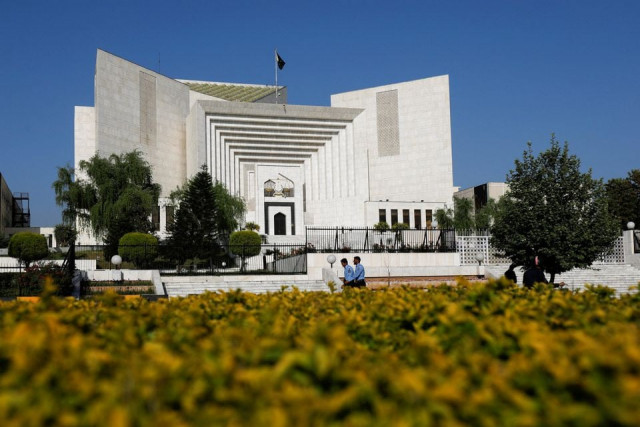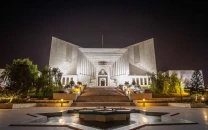SC allows FBR to recover super tax
Tax expert said that many taxpayers challenged the imposition of the super tax before high courts.

The Supreme Court, while setting aside the Lahore High Court interim order, has directed taxpayers/respondents to pay 50 per cent of their due liability through “super tax”.
A division bench of the apex court, comprising Chief Justice of Pakistan Umar Ata Bandial and Justice Athar Minallah, heard the Federal Board of Revenue’s (FBR) petition against the LHC interim order.
Last year, Prime Minister Shehbaz Sharif had imposed a 10 per cent super tax on large-scale industries in a bid to shore up revenues amid rising inflation.
Meanwhile, Hafiz Ahsaan Ahmad Khokhar, who was arguing the FBR cases before the superior courts, explained that through the Finance Act 2022-2023, parliament had introduced Section 4C in the Income Tax Ordinance 2001, and the government at the time of passing of the budget had hoped to collect Rs215 billion to Rs247 billion under the head.
Khokhar said that as per the language of Section 4C of the Ordinance, a super tax shall be imposed for the tax year 2022 and onwards at the rates specified in Division IIB of Part I of the First Schedule, on the income of every person where income exceeds Rs150 million.
According to the senior tax advocate, for tax year 2022 the rate of super tax under the section will be 10 per cent instead of four per cent, where the income of the persons engaged, partly or wholly, in the business of airlines, automobiles, beverages, cement, chemicals, cigarette and tobacco, fertilizer, iron and steel, LNG terminal, oil.
The tax lawyer said that for tax year 2023, this super tax on income of banking companies will be 10 per cent if the income for the year exceeds Rs300 million.
Khokhar said that it was a very high rate of income tax or company tax paid by those with a very high level of income or profit to help make up the deficit in the public spending budget or to allocate the amount for poverty alleviation in the country.
He explained that the super tax was levied on a certain class of taxpayers in the rates between 1 per cent to 10 per cent on income groups who earn at least Rs150 million and that kind of tax was first introduced through the insertion of Section 4B of the Income Tax Ordinance (ITO) of 2001 for the rehabilitation of displaced persons through the Finance Act of 2015.
Read Dar stops FBR from using tax money
The tax expert said that many taxpayers challenged the imposition of the super tax with retrospective effect for tax year 2022 and onwards before high courts.
The Lahore High Court through an interim order had directed the FBR to allow different industries to file their returns excluding the super tax under Section 4C of the Income Tax Ordinance 2001 subject to deposit of post-dated cheques of differential amount. “The cheques shall be encashed on the direction of the court or subject to final decision of the case. Subsequently, the FBR challenged the interim order before the Supreme Court which directed the taxpayers/respondents to pay 50 percent of their due liability covered under amended Section 4C of the Income Tax Ordinance 2001 to tax department within 7 days from the date of Supreme Court orders.
The Sindh High Court had already struck down up to 10 per cent super tax to the first proviso to Division IIB of Part I of the First Schedule to the Income Tax Ordinance 2001 and declared it to be discriminatory, thus ultra vires to the Constitution.
Khokhar said that there was no cavil with the legal principle that a charging provision in a fiscal statute was to be given a strict interpretation and added “if a case does not fall within the purview thereof, tax cannot be charged from a person from whom it is being claimed”.
“However, there is no doubt that the legislature has the power to make a law retrospective and this includes a power to give retrospective effect to a taxing statute, and in this particular case the legislatures has given their retrospective effect words through the Finance Act 2022-2023 and stated that the amended Section 4C of Income Tax Ordinance 2001 read with Division IIB of Part I of the First Schedule of Ordinance would apply from the assessment year 2022 and onwards which means to apply as retrospectively, and there are many judgments of the Supreme Court ratifying such taxing legislation with retrospective effect and upholding the legislation on different occasions.
Another lawyer told The Express Tribune that “apparently, the SHC judgment stood nullified by the Supreme Court order”.



















COMMENTS
Comments are moderated and generally will be posted if they are on-topic and not abusive.
For more information, please see our Comments FAQ